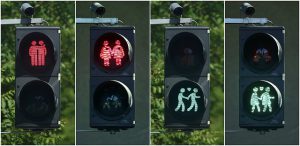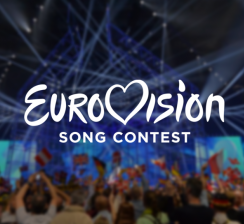Forty countries are competing for the Eurovision Song Trophy in Vienna this year. After the semi-finals, twenty seven countries have qualified for the Grand Finale on 23 May. With a big group of followers among supporters of lesbian, gay, bisexual, and transgender (LGBT) rights, this year’s show promises more than just light entertainment.
Ever since its creation 60 years ago, the Eurovision Song Contest has gone through several stages to become, finally, a cheesy and quirky annual event. It has always offered, though, a career platform for rising pop stars such as Abba and Celine Dion, who later became famous. The contest gained prominence over time. From only seven European countries participating in the 1950s, it reached the current level of participation and an audience of close to one billion people.
Each country is represented by a song, which can win if it receives more votes than any other competitor. The voting system includes public voting through telephone, SMS, or via an official app and expert voting through a jury in each country, each determining the outcome in a proportion of 50%.
Participating countries have to be members of the European Broadcasting Union, an alliance of public media entities, or they can be invited as guests if they had previously screened the show on their public media channels. This has left the doors open to the participation of countries such as Morocco in 1980 or Australia in 2015.
Given its popularity in Europe and beyond, Eurovision has been studied by social scientists, who have described the show as an intercultural avant garde event promoting ethno-national peace following World War II in Europe under a kitsch-driven zone of familiarity. The winning Italian song “Insieme (together) Unite Unite Europe” in 1990 illustrates this point clearly. The initial goal of promoting a European kinship got traction years later, when, after the fall of Yugoslavia and despite genocide and mass atrocities committed between Serbs, Croats and Bosnians, the Serbian song won in 2007 thanks to the votes of their neighbors and former belligerents.
Given its popularity in Europe and beyond, Eurovision has been studied by social scientists, who have described the show as an intercultural avant garde event promoting ethno-national peace following World War II in Europe under a kitsch-driven zone of familiarity.
Although the contest has strict rules, according to which participants promoting political messages are banned from the competition, it also has a history of songs strattling that thin line between activism and pure cheesiness. Georgia’s “We Don’t Wanna Put In” was interpreted as an indirect message to then Russian Prime Minister Vladimir Putin following the war between Russia and Georgia in 2008, the same way that Portugal’s “E Depois do Adeus” (And after the farewell), was used as a signal to start the Carnation Revolution in 1974.
Most recently, social issues have been a potent, underlying message. In the 1990s, a transsexual Israeli singer called Dana International won the contest. This was seen as a breakthrough for trans visibility. Respect for equality and human rights was a message brought home by other contestants in the years that followed, culminating with the victory of the woman with facial hair in 2014, the Austrian Conchita Wurst.
 For some participating countries such as Serbia, Eurovision, or “The Gay World Cup” as it became known in Britain, was seen as contributing to making society more tolerant. The winner, Marija Šerifović, came out as a lesbian five years after her victory and became an icon for LGBT rights in traditionally conservative Serbia. For other participants, such as Finland, marriage equality was a visible message during Krista Siegfrids’ performance in 2013. Similarly, on the occasion of the 2014 edition of the Eurovision Song Contest held in Copenhagen, the city organized wedding ceremonies for tourists to promote a LGBT friendly Denmark.
For some participating countries such as Serbia, Eurovision, or “The Gay World Cup” as it became known in Britain, was seen as contributing to making society more tolerant. The winner, Marija Šerifović, came out as a lesbian five years after her victory and became an icon for LGBT rights in traditionally conservative Serbia. For other participants, such as Finland, marriage equality was a visible message during Krista Siegfrids’ performance in 2013. Similarly, on the occasion of the 2014 edition of the Eurovision Song Contest held in Copenhagen, the city organized wedding ceremonies for tourists to promote a LGBT friendly Denmark.
Russia, where LBGT rights are being questioned and intolerance is on the rise, seems to be the black sheep of the contest. Even though the Tolmachevy Sisters tried to paint a softer image of the country in 2006 when they appeared on stage with their ponytails intertwined, one could argue that the old fault lines of the Cold War are still visible between an onward-looking, tolerant West and an old-fashioned, backward-looking East.
This year’s edition of Eurovision combines political and social activism with reference to the UK’s exit from the EU, the Armenian genocide, and LGBT rights to equal citizenship in modern European countries.


